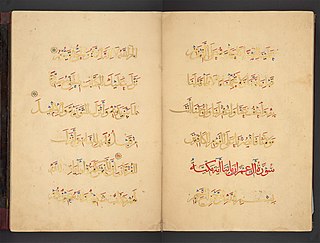Related Research Articles
In Islam, duʿāʾ is a prayer of invocation, supplication or request, asking help or assistance from God. Duʿāʾ is an integral aspect of Islamic worship and spirituality, serving as a direct line of communication between a believer and Allah. Unlike the formal five daily prayers (Salah) which have specific timings and rituals, duʿāʾ is more flexible and can be made at any time and in any place. Through duʿāʾ, Muslims affirm their dependence on Allah and their trust in His wisdom and mercy.
Al-Ikhlāṣ, also known as the Declaration of God's Unity and al-Tawhid, is the 112th chapter (sūrah) of the Quran.

Al Imran is the third chapter (sūrah) of the Quran with two hundred verses (āyāt).
Taqwa is an Islamic term for being conscious and cognizant of God, of truth, "piety, fear of God." It is often found in the Quran. Those who practice taqwa — in the words of Ibn Abbas, "believers who avoid Shirk with Allah and who work in His obedience" — are called muttaqin.
At-Tawbah is the ninth chapter of the Quran. It contains 129 verses and is one of the last Medinan surahs. This Surah is known by two names, At-Taubah and Al-Bara'at. It is called At-Taubah in light of the fact that it articulates taubah (atonement) and informs about the conditions of its acceptance.. The name Bara'at (Release) is taken from the opening word of the Surah.

Al-Anfal is the eighth chapter (sūrah) of the Quran, with 75 verses (āyāt). Regarding the timing and contextual background of the revelation, it is a "Medinan surah", completed after the Battle of Badr. It forms a pair with the next surah, At-Tawba.
An-Nisa' is the fourth chapter (sūrah) of the Quran, with 176 verses (āyāt). The title derives from the numerous references to women throughout the chapter, including verse 34 and verses 4:127-130.
Al-Muʼminun is the 23rd chapter (sūrah) of the Qur'an with 118 verses (āyāt). Regarding the timing and contextual background of the supposed revelation, it is an earlier "Meccan surah", which means it is believed to have been revealed before the migration of the Islamic prophet Muhammad and his followers from Mecca to Medina (Hijra).

Al-Ḥadīd is the 57th chapter (sūrah) of the Quran with 29 verses. The chapter takes its name from that word which appears in the 25th verse. This is an Al-Musabbihat surah because it begins with the glorification of Allah.
Al-Ḥashr is the 59th chapter (sūrah) of the Qur'an and has 24 Āyahs (verses). The chapter is named al-hashr because the word hashr appears in verse 2, describing the expulsion of Jewish Banu Nadir tribe from their settlements. The surah features 15 attributes of God in the last three verses. A similitude is given in verse 21. Verse 6 may be related to the controversies of the land of Fadak.
The Hypocrites is the 63rd chapter (surah) of the Qur'an, with 11 verses. Almost all of the chapter is preserved in the Ṣan‘ā’1 lower text.
Al-Mulk is the 67th chapter (surah) of the Quran, comprising 30 verses. Surah Al Mulk emphasizes the greatness of Allah and His creation, urging believers to reflect on the signs of God's power in the universe.
Aṭ-Ṭāriq, is the eighty-sixth sura of the Quran, with 17 ayat or verses. Muslims believe this chapter was revealed in Mecca at a time when the Disbelievers were employing all sorts of devices and plans to defeat and frustrate the message of the Quran and Muhammad.

Al-Aʻlā is the eighty-seventh chapter (surah) of the Qur'an, with 19 ayat or verses.
The Quranic account of the disciples of Jesus does not include their names, numbers, or any detailed accounts of their lives. Muslim exegesis, however, more-or-less agrees with the New Testament list and says that the disciples included Peter, Philip, Thomas, Bartholomew, Matthew, Andrew, James, Jude, John and Simon the Zealot. Scholars generally draw a parallel with the disciples of Jesus and the companions of Muhammad, who followed Muhammad during his lifetime, 600 years later.
Al-Walid ibn al-Mughira al-Makhzumi was the chief of the Banu Makhzum clan of the Quraysh tribe.

The siege of Banu Qurayza took place in Dhul Qa‘dah during January of 627 CE and followed on from the Battle of the Trench.
In Sunni Islam, the Hadith of Gabriel is a hadith of the Islamic prophet Muhammad which expresses the religion of Islam in a concise manner. It is believed to contain a summary of the core of the religion of Islam, which are:
- Islām (إسلام), which is described with the "Five Pillars of Islam,"
- Īmān (إيمان), which is described with the "Six Articles of Faith,"
- Iḥsān (إحسان), or "doing what is beautiful," and
- al-Sā’ah (الساعة), or The Hour, which is not described, but its signs are given.
Expedition of Abu Qatadah ibn Rab'i al-Ansari, to Batn Edam took place in November 629 AD, 8AH, 8th month, of the Islamic Calendar
Al-Musabbihat are those suras of the Quran that begin with statements of Allah's glorification: 'Subhana', 'Sabbaha', and 'Yusabbihu'. According to Islamic scholar Muhammad Shafi Deobandi (1897–1976) the collective name of the series Al-Musabbihat refers to the following five or seven Surahs:
References
- ↑ George Sale translation
- ↑ Rev. E. M. Wherry, M.A. A Complete Index to Sale's Text, Preliminary Discourse, and Notes
- ↑ Sunan al-Tirmidhi English reference : Vol. 5, Book 44, Hadith 3309 Arabic reference: Book 47, Hadith 3624